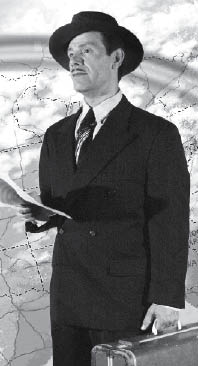Next story: Words Without Borders: The World Through the Eyes of Writers
Words and Music
by Thomas Dooney

Heather Violanti never set out to write a musical. She is, indeed, a playwright, and does hope for a career writing within her métier. Moreover, she has significant credentials as a dramaturge with impressive training and experience in that discipline. Violanti’s preference is for works of the classic avant garde, especially the good old days of Paris’s Banquet Years, and for Elizabethan theater, especially murky problem dramas.
By any reckoning, Harold Arlen, writer of an incomparable list of America’s favorite songs would seem rather an unlikely subject for a play by Heather Violanti. He wrote “Over the Rainbow,” one of the most popular songs of the 20th century. He wrote “Stormy Weather,” perhaps one of the most perfectly written songs, with not an extraneous lyric or a false note within it. Arlen could write a song on which a singer could hang an entire career.
“My father [former Buffalo News staff writer Anthony Violanti] had written an article for First Sunday magazine,” Violanti says. “Originally he was supposed to write a play on Arlen but he got a job in Florida and was unable to finish writing it, so he passed it on to me.”
The article by Violanti pere first appeared in February 2005, observing the 100-year anniversary of Arlen’s birth on Buffalo’s East Side. The News reran the vintage article last week as a boost to Heather, a News free lancer herself, and what is now her new show.
A Rainbow Journey: The Harold Arlen Story, premiering at Musicalfare, benefits from Violanti’s interests if not her initiation. She has focused herself on the life between the songs, both as a theatrical scheme and as a biographic statement.
“Randy Kramer [Musicalfare’s artistic director, who is staging this show] wanted more than a typical review. So we have a strong throughline and the music moves our plot forward rather than merely having one ‘greatest hit’ after another. After working and meeting with Randy Kramer for about a year and half, we developed this story that takes place on April 23, 1986, which is the date Harold Arlen died.
“He has just died, but he doesn’t know it. A caretaker has come to help pass him along to the other side. We flash to key points in his life,” she says, adding, “but we keep returning to 1986.”
It is a structure not dissimilar to Faust. (And why not Marlowe’s since Elizabethans are on the table?) A great man. A mortal struggle with the metaphysical. (Or maybe a metaphysical struggle with mortality.) A contemplation upon art and life and how they complement each other.
However, Violanti says she took cues less from masterpiece scripts and more from the ways plays were staged of yore. First, she indicates, she wanted to avoid attempts at literal realism. “What I like about Elizabethan theater is that there was no scenery,” she affirms. “The setting came from the words. There is a cinematic flow to everything. I tried to keep that flow in this play…which was kind of a nightmare for the designers and a challenge to the actors. They have to keep up with changes of time and location that come so quickly.”
Retrospection as used in this play would seem to suit Arlen, a writer of reflective, sophisticated material—sometimes too sophisticated for broad public taste. “I hope it comes across that Arlen learns to value what he has accomplished and even to value himself,” Violanti says. “Maybe this is just my particular take on Harold Arlen, but I think he was a really modest person. I think it bothered him that he was not as famous as the Gershwins or Irving Berlin even though he never wanted celebrity. I hope to show his character learns as the play progresses that his life was worth something.”
Violanti seems to empathize with Arlen’s melancholy nature. Even in his happiest songs grey clouds scud by. But for every cloud there is a rainbow. The bad weather and dark nights that recur in his lyrics manage to give way to pleasanter times. Emotional highs and lows occurring in each song make them so interpretable by singers the likes of Sinatra, Garland, Fitzgerald, Horne and Bennett. And of course by singing actors as cast at Musicalfare.
Violanti concedes that her first go at playwrighting seen in Buffalo was not a pinnacle of any sort. She recalls her one-act play titled Flamingo Bingo produced as part of Alleyway Theatre’s Buffalo Quickies some years ago earned her special attention from critics. “One reviewer,” she says—yes, from the Buffalo News—“called it ‘the low point of the evening.’” She laughs at the memory, even at herself, but she is determined to do right by Arlen.
When Arlen was working at MGM on The Wizard of Oz, studio executives several times tried to have “Somewhere Over the Rainbow” cut from the film. They thought the song was too good for the film and too grand for the character. The decades proved Arlen’s ability, honesty and many talents. Violanti wants to show it was worth the wait.
A Rainbow Journey: The Harold Arlen Story, presented by Musicalfare Theater, runs April 18 through May 20. 4380 Main Street, Amherst, on the campus of Daemen College. Call 839-8540 or visit musicalfare.com.
|
Issue Navigation> Issue Index > v6n14: Polonia on Parade (4/5/07) > Words and Music This Week's Issue • Artvoice Daily • Artvoice TV • Events Calendar • Classifieds |









 Current Issue
Current Issue